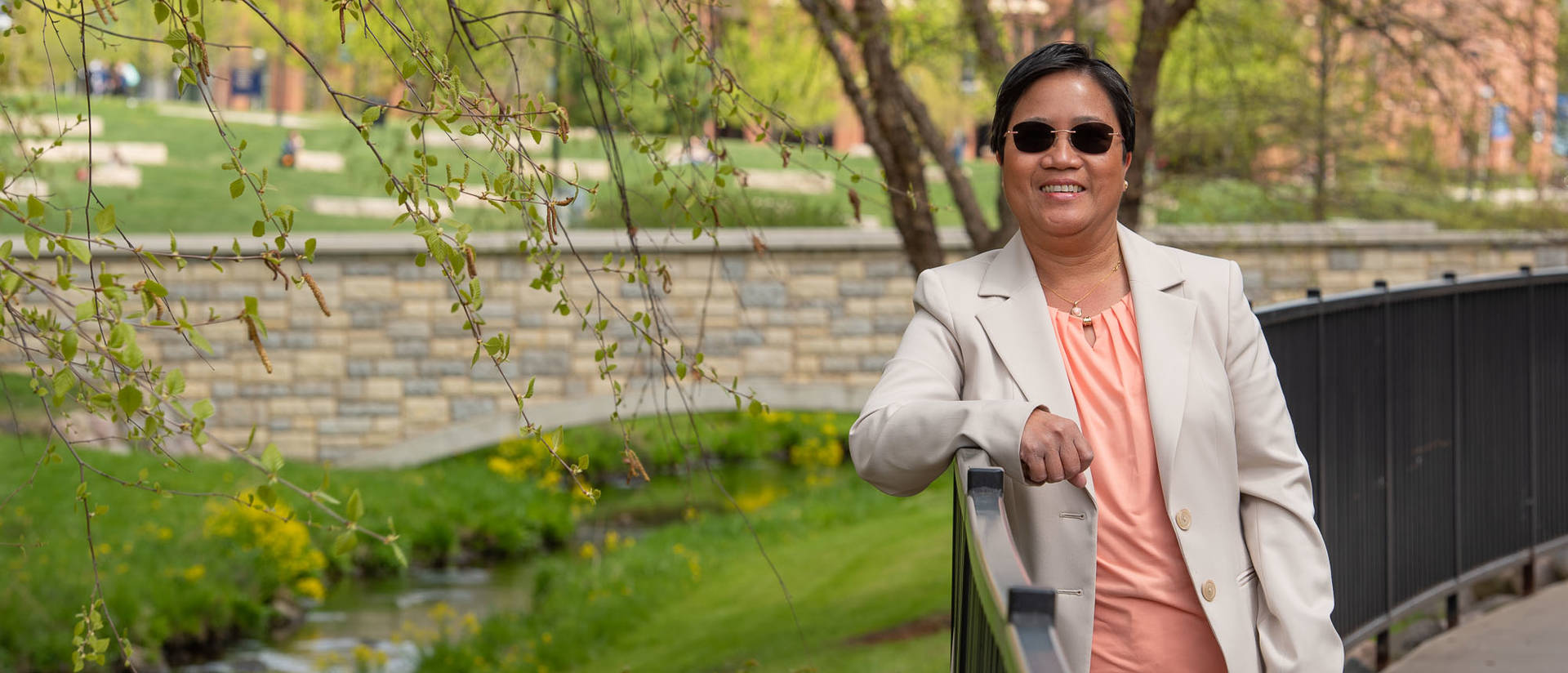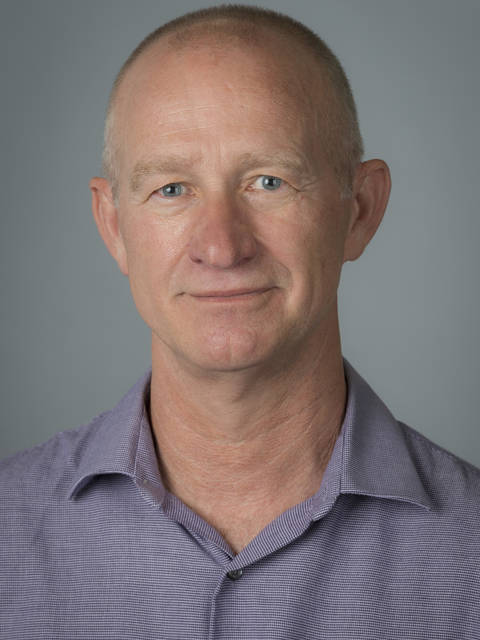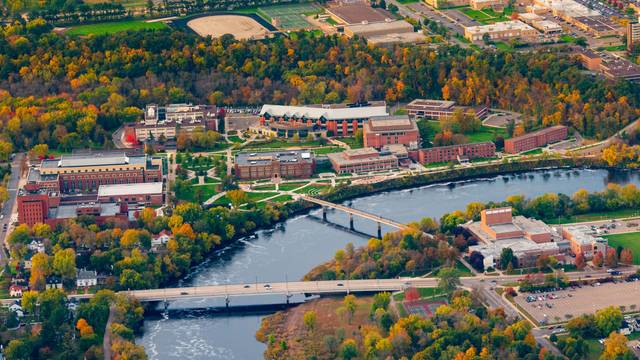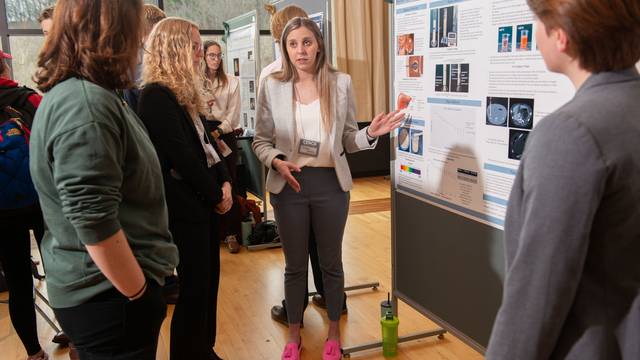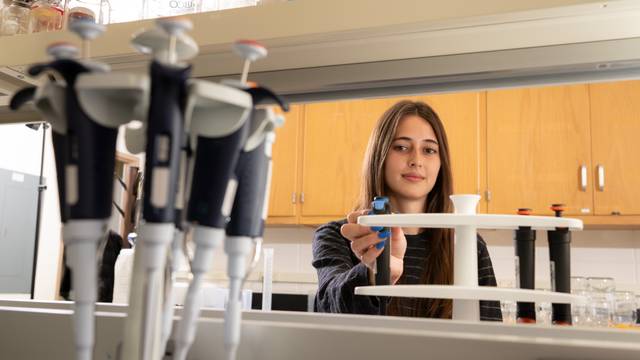Photo caption: Ma. Theresa “Marie” Corpuz Fredrickson of Amery will receive her doctor of nursing practice degree this month at UW-Eau Claire.
Life was difficult for Ma. Theresa “Marie” Corpuz Fredrickson growing up poor in a rural region of the northern Philippines.
Fredrickson’s father swept floors in a market where her mother sold vegetables. When schoolchildren teased her about her parents’ occupations, her mother, who never finished elementary school, told her daughter that strength and education would provide her with a better life.
“My mother said the only thing they could give me was the chance to go to school to do my best, and to get a good job,” Fredrickson says. “She said you have to be strong and speak for yourself. Don’t be shy.”
Fredrickson has heeded that parental advice throughout her life, pursuing a civil engineering career in the Philippines. When tragedy struck her family, she moved with her young son to the U.S. and made what she calls a 360-degree career change into the nursing profession.
She will graduate this month with an advanced degree — a doctor of nursing practice (DNP) — from the University of Wisconsin-Eau Claire.
“When given a situation, I just adapt to it,” says Fredrickson, of Amery. “If I have lemons, I will make lemonade. I am resilient to all my experiences in life. Nothing is that hard then.”
Fredrickson makes it sound easy, but the transition from engineering to nursing was a remarkable undertaking, says Dr. Mary Zwygart-Stauffacher, a professor of nursing in the College of Nursing and Health Sciences.
It’s often difficult for people with established careers to switch professions, Zwygart-Stauffacher says, and Fredrickson had the additional challenge of immigrating from another country. Fredrickson started in the health care field as a certified nursing assistant and has taken the multistep journey to a doctoral degree.
“At any point along the way, if she had decided not to continue this trajectory, people would have understood,” Zwygart-Stauffacher says. “Yet, she continued to persevere and to take on the new challenges. There were many times she could have stayed where she was in the profession, yet she chose to move forward in her education.
“She had the drive. She could see there was more to learn, more she could contribute to the needs of patients and community.”
Engineering career
In her homeland, Fredrickson was a strong student and worked hard to obtain an engineering degree. She worked for a Japanese company in Manila, where she worked on job sites erecting manufacturing facilities.
“I enjoyed my work as a civil engineer,” Fredrickson says. “I felt I was strong in math and critical thinking. I wanted to build buildings.”
But Fredrickson’s life changed in 1999 when her husband, Ruben, died of complications from cancer at age 32, leaving her with an eight-month-old son to raise alone.
A friend eventually introduced her to a farmer who the friend knew from Wisconsin. The two corresponded through the mail and in 2003, Randy Fredrickson traveled to Manila to marry her. A year later, she moved with her son to the U.S.
“I’m lucky that God gave me two good guys,” Fredrickson says. “It was God’s will for me to come here. That is a humbling experience for me.”
But Fredrickson’s engineering career could not continue in the U.S. because her degree from the Philippines was not accredited in America. As she contemplated a second career, a relative suggested health care as an option.
Working as a certified nursing assistant (CNA), Fredrickson soon discovered she had a knack for working with patients.
“When I was in engineering, I didn’t have this connection with people,” Fredrickson says. “I learned a lot being a CNA, how to make people comfortable. That is so rewarding. I had that connection. It changes your perspective because there is fulfillment.”
After working as a CNA, Fredrickson became a licensed practical nurse, earned an associate degree in nursing and completed her bachelor’s degree in nursing. After seven years as a registered nurse, she enrolled at UW-Eau Claire to obtain her DNP.
“It’s never too late to learn again and learn new things,” Fredrickson says of her decision to obtain a doctorate degree. “I still have the skills and ability.”
Fredrickson believes her engineering background has been helpful in her nursing career. She currently works at an Amery nursing home and the hospital in Shell Lake.
“The way I organize, I think I am being methodical,” Fredrickson says. “I look at approaching deadlines differently, very proactive. I have balance and less stress because I was in engineering first. I survived engineering.”
In her synthesis paper as part of her DNP degree, Fredrickson states the transition from civil engineer in the Philippines to becoming a nurse in the U.S. was “a real transformation for me.”
“I viewed the transition as a humbling experience being in a technical field to embrace the full art and science of nursing,” she wrote.
Fredrickson says she learned to intertwine the two professions. Her organizational skills from her engineering background blended with the nursing process of assessment, planning, implementing and evaluating every aspect of patient care.
“Being a nurse has made me a better person to be seeing more with less; to be more open-minded and accepting of individual differences; and to care for my patients in an individualized way without prejudice or stereotype,” she wrote in the paper.
Dr. Lisa Schiller, nursing graduate programs director in the College of Nursing and Health Sciences and an associate professor of nursing, says Fredrickson is curious, persistent and determined, with a passion for the profession.
“She is detail-oriented, a trait valued in both nursing and engineering,” Schiller says. “She is a self-driven learner, always seeking a broader understanding.”
UW-Eau Claire experience
Fredrickson is happy with her decision to pursue her DNP at UW-Eau Claire. Her instructors were supportive and always willing to assist if a problem arose, Fredrickson says.
“I am thankful for UW-Eau Claire on my journey to be successful,” Fredrickson says. “I hope to make my school proud.”
Fredrickson’s goal is to make a difference in patients’ lives by being their primary health care provider. She says she now can see the “big picture” and has the ability to improve patients’ lives in the future.
Compassion for people is a trait that has, and will continue to, serve Fredrickson in her nursing career, Zwygart-Stauffacher says.
“There is the science part she brings, but there also is that human connection, that ability to be with people and connect; she has that too,” Zwygart-Stauffacher says.
COVID-19 made the past year complicated and challenging for UW-Eau Claire’s doctorate-seeking nursing students, Schiller says.
“The graduate students who are graduating have truly been challenged as they transitioned to virtual learning and balanced school, work and life,” Schiller says. “Most of our graduate students are working RN’s who were challenged by excessive demands at their workplaces.”
Many of the graduate students were forced to withdraw from their clinical placements during the pandemic, requiring them to do additional clinical hours during their final academic year and participate in new clinical simulation activities such as telehealth and the use of virtual standardized patients, Schiller says.
Resiliency is the word that describes the students graduating this month, Zwygart-Stauffacher says.
“I think Marie did exceptionally well,” Zwygart-Stauffacher says. “Like her classmates, she did excel and manage under really challenging times. They represent the profession extremely well and role-modeled how it is to survive and persevere and excel during such challenging times.”
